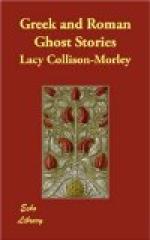Before leaving these stories of visions of the dead, we must not omit to mention that charming poem of Virgil’s younger days, the Culex (The Gnat). Just as the first sketch of Macaulay’s famous character of William III. is said to be contained in a Cambridge prize essay on the subject, so the Culex contains the first draft of some of the greatest passages in Virgil’s later works—the beautiful description of the charms of country life in the Georgics, for instance, and the account of Tartarus in the sixth book of the AEneid. The story is slight, as was usually the case in these little epics, where the purple patches are more important than the plot. A shepherd falls asleep in the shade by a cool fountain, just as he would do in Southern Italy to-day, for his rest after the midday meal. Suddenly a snake, the horrors of which are described with a vividness that is truly Virgilian, appears upon the scene and prepares to strike the shepherd. A passing gnat, the hero of the poem, sees the danger, and wakes the shepherd by stinging him in the eye. He springs up angrily, brushes it off with his hand, and dashes it lifeless to the ground. Then, to his horror, he sees the snake, and promptly kills it with the branch of a tree.
While he lies asleep that night, the ghost of the gnat appears to him in a dream, and bitterly reproaches him for the cruel death with which it has been rewarded for its heroic services. Charon has now claimed it for his own. It goes on to give a lurid description of the horrors of Tartarus, and contrasts its hard lot with that of the shepherd. When he wakes, the shepherd is filled with remorse for his conduct and is also, perhaps, afraid of being continually haunted by the ghost of his tiny benefactor. He therefore sets to work to raise a mound in honour of the gnat, facing it with marble. Round it he plants all kinds of flowers, especially violets and roses, the flowers usually offered to the dead, and cuts on a marble slab the following inscription: “Little gnat, the shepherd dedicates to thee thy meed of a tomb in return for the life thou gavest him."[77]




